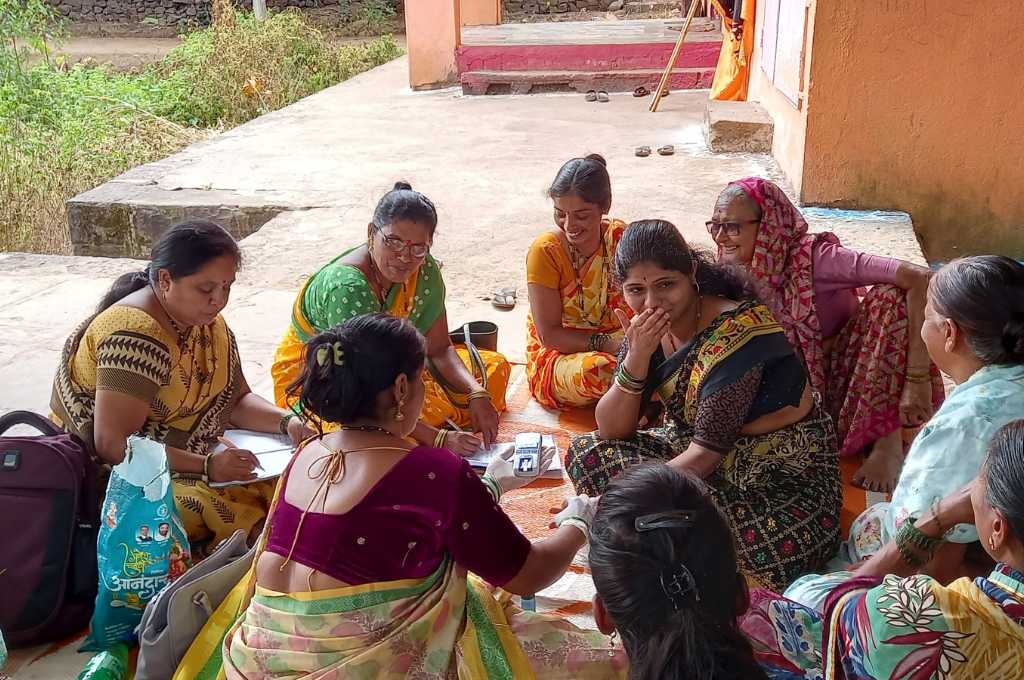Celebrating blood tests: Transforming health norms in rural Maharashtra

In our experience of working in the health sector, we have found that women in many parts of India tend to place health at the bottom of their priorities. In Velhe village, located in Maharashtra’s Pune district, the situation is no different. The attention given to health is dictated by the family and influenced by the women’s own perceptions. Women lack information about the need for basic preventive medical check-ups, and they consider health a private issue to be discussed with a doctor. Moreover, women feel that they’re not supposed to ask questions about the diagnosis and treatment—they must simply obey the expert’s advice.
Given this context, in 2018, when we thought of starting a campaign to check the haemoglobin (Hb) count for women, it was inconceivable that they would come forward voluntarily to get themselves tested. We decided to launch the campaign during Diwali since it is a major festival in rural Maharashtra and coincides with the monsoon harvest (typically in early October). In villages, such festivals are an occasion for individual as well as group celebrations and community gatherings or jatras around famous local temples. We wanted to plant the idea of awareness about women’s health while large groups of women participated in the social functions during Navratri. In the end, the campaign achieved two things: removing the taboo around getting a blood test, that too in a public setting, and highlighting the importance of regular blood tests.
In the first year, many women did not want to have their blood drawn, some due to a fear of needles and others because of the timing. “Why during the auspicious time of the festival? Can we not do it some other time?” they would ask.
Since Jnana Prabodhini, the organisation that we work with, already conducts a few other exercises in this region, we were able to organise small gatherings with the local self-help group where many of the misconceptions that the women had were addressed openly. The presence of the local ASHA worker, a known face, also helped in building trust and communication. The blood testing campaign blended seamlessly with the many activities that were going on at the time—sports events, songs, and dance competitions—which were also organised by Prabodhini volunteers to celebrate Navratri. In this way, the campaign ceased to be solely about health and took on a more festive spirit. Women became less inhibited about getting tested.
The ASHA worker conducted the tests and read out the results in the presence of all the participants. Those with a high or ‘good’ Hb count (more than 13) were felicitated and acknowledged with a gift. Those with an Hb count of less than eight were counselled and asked to consult the ASHA worker for appropriate tablets. Discussions were held about the implications of low Hb on a person’s health, including lack of stamina during farm work, and foods that can improve Hb count.
Approximately 100 women came forward to have their blood tested in the first year. In 2023, this number has increased to approximately 1,300 women, who live across 48 villages in two blocks—Bhor and Velhe—in Pune. Health, once a forbidden topic, is now a point of conversation. The fear, and associated anxiety, of doing something unknown has given way to responses such as “Let me find out where I stand and take corrective measures.” The exercise has become so popular that even the men in these villages are asking to be tested now.
Dr Ajit Kanitkar is a researcher and policy analyst based in Pune. Suvarna Gokhale heads the Stree Shakti Grameen department of Jnana Prabodhini.
—
Know more: Learn more about the challenges faced by married women in rural Maharashtra due to the absence of a marriage certificate.
Do more: Connect with the authors at kanitkar.ajit@gmail.com and suvarna.gokhale@jnanaprabodhini.org to know more about and support their work.



